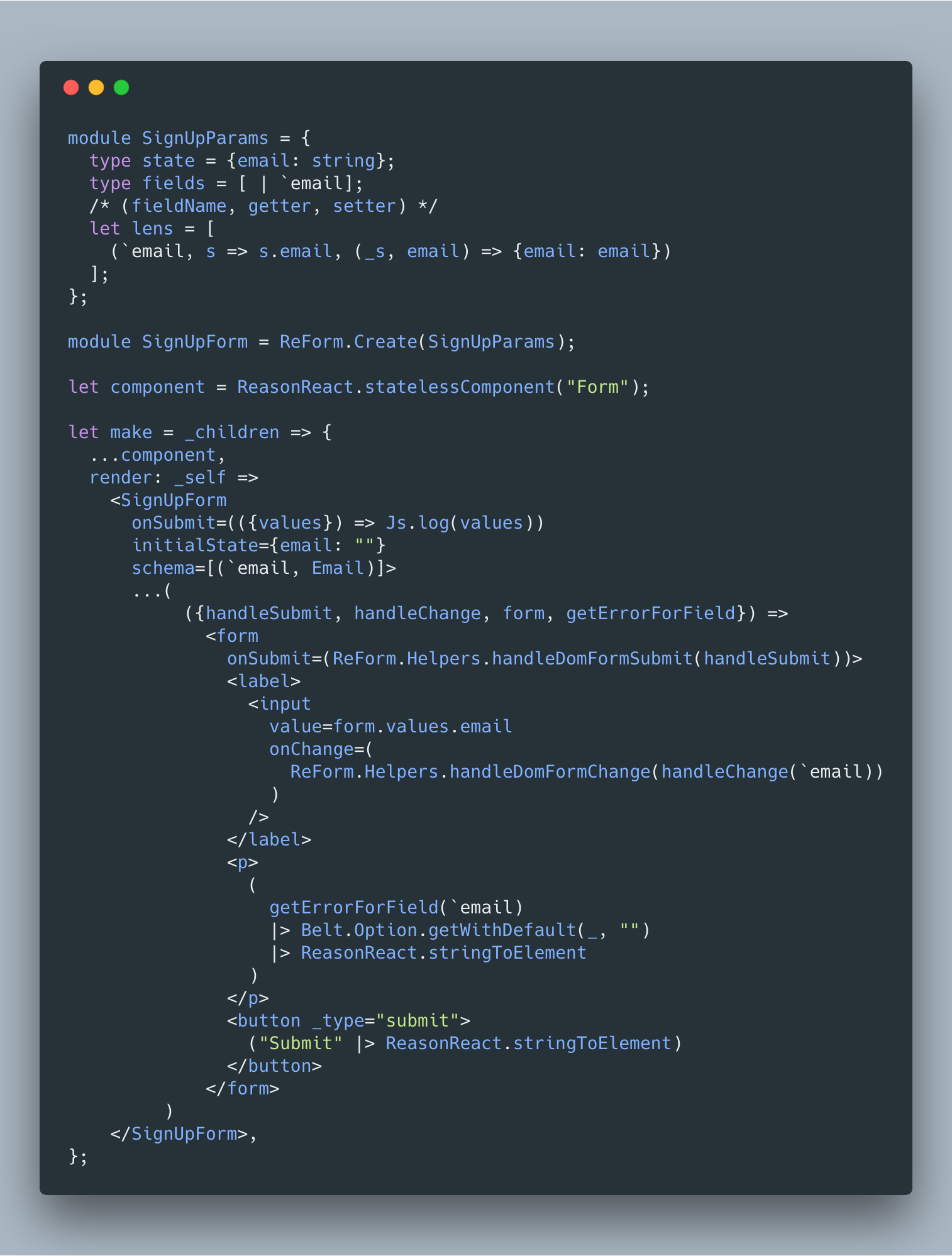ReForm.re
Reasonably making forms sound good again (pun 100% intended)
Installation
yarn add bs-reform
Then add it to bsconfig.json
"bs-dependencies": [
"bs-reform"
]
What this is and why
Code that deals with strongly typed forms can quickly become walls of repeated text. We created ReForm to be both deadly simple and to make forms sound good leveraging ReasonML's powerful typesytem. Even the schemas we use are nothing more than constructors built-in in the language itself with a small size footprint.
Usage
Checkout demo/src/app.re also
module SignUpParams = {
type state = {email: string};
type fields = [ | `email];
/* (fieldName, getter, setter) */
let lens = [(`email, s => s.email, (_s, email) => {email: email})];
};
module SignUpForm = ReForm.Create(SignUpParams);
let component = ReasonReact.statelessComponent("Form");
let make = _children => {
...component,
render: _self =>
<SignUpForm
onSubmit=(({values}) => Js.log(values))
initialState={email: ""}
schema=[(`email, Email)]>
...(
({handleSubmit, handleChange, form, getErrorForField}) =>
<form
onSubmit=(ReForm.Helpers.handleDomFormSubmit(handleSubmit))>
<label>
<input
value=form.values.email
onChange=(
ReForm.Helpers.handleDomFormChange(handleChange(`email))
)
/>
</label>
<p>
(
getErrorForField(`email)
|> Belt.Option.getWithDefault(_, "")
|> ReasonReact.stringToElement
)
</p>
<button _type="submit">
("Submit" |> ReasonReact.stringToElement)
</button>
</form>
)
</SignUpForm>,
};API
We made the API simple yet powerful and thus avoided a lot of quirks
Component params
Each ReForm module is a ReasonReact component
/* Just regular ReasonReact */
module Form = ReForm.Create(SignUpFormParams);These are the props/params it accepts:
schema param
ReForm uses a Schema using idiomatic ReasonML to validate your data.
validate param
ReForm includes a number of validators, however they can't cover every case. Writing your own validator is trivial:
let validate: SignUpForm.values => option(string) = (values) => {
switch (values) {
| { email: "unsafeTypeGuy@ohno.com" } when values.password === "secretThing" => Some("Can't do.")
| _ => None
}
}
<Form
validate
/* Yes! You can still use schema with it */
schema=[(`email, Email)]
>The returned valued of validate will set reform.form.error
onSubmit param
If your data is validated then onSubmit will be called. This should contain your POST/mutation/whatever logic into and is triggered after handleSubmit is called.
let onSubmit = ({values, setError, setSubmitting, resetFormState}) => {
Js.Promise.(
values
|> convertToJS
|> mutate
|> then_(response => {
switch(response##error |> Js.Null_undefined.to_opt) {
| None =>
setSubmitting(false);
/* if you need to reset the form state to the initialState */
resetFormState();
doSomeOtherThing();
| Some(error) =>
setSubmitting(false);
setError(Some("Something went wrong, try again"))
}
})
)
|> ignore
}
<Form schema onSubmit>onFormStateChange param
This optional param will be called every time the form state changes. You might use this to lift the form state to its parent for example.
Its type is the same as the reform.state passed to the children.
<Form
onFormStateChange=formState => Js.log(formState)
>i18n param
ReForm supports internationalization. If you use this then your error messages should be message keys.
children: (YourForm.reform => ReasonReact.reactElement)
The param passed to the children has the following type:
type reform = {
form: state,
handleChange: (Config.fields, value) => unit,
handleGlobalValidation: option(string) => unit,
handleSubmit: unit => unit,
getErrorForField: Config.fields => option(string)
};form: Params.state
reform.form contains the following
{
/* The record containing the actual form state */
values: Params.state,
/* The submitting state */
isSubmitting: bool,
/* This is intended to store global validation error, like a submitting failure */
error: option(string)
}handleChange: (Config.fields, string) => unit
handleChange takes the field and (string) value. This is an extension point that could be used in both Web and React Native
handleSubmit: unit => unit
Triggers the submitting and makes ReForm set reform.form.isSubmitting to true
getErrorForField: Config.fields => options(string)
Returns the (optional) validation error for the field in question
handleGlobalValidation: option(string) => unit
Handles the global error value at reform.form.error
Schema
ReForm's schema consists simply of a (fieldName: string, validator: constructor) tuple. The first item is the name of the field and the second property is a constructor.
For example:
(fieldName, validator)or
(`email, Email)It is passed as the first param for a Form: <SignInForm schema>
For more details, look at the demo to see it in action.
Available validators
Custom(state => option(string))
(`password, Custom(values => values.password == "123" ? Some("Really?") : None))Required
(`fullName, Required)(`email, Email)Support
The authors regularly hand out at the wonderful https://discord.gg/reasonml or https://reasonml.chat so feel free to visit us there.
